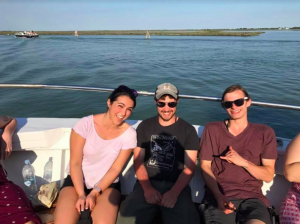
Jul 28, 2017 | Feature |

UMF Custodian Woody Woodcock in Emery Arts Community Center. Photo by Dawn Nye
By Lindsay Mower – Staff Reporter
If you’re roaming the halls of Merrill Hall late in the evening, perhaps while taking the opportunity to practice piano with no one else around to listen, you’ll always have at least one audience member: this is Woody Woodcock, the custodian who works the night-shift in Merrill Auditorium and Emery Community Arts Center.
A graduate of Livermore Falls High School, Woodcock is no stranger to Franklin County, as he would proudly tell you. After working at the IGA Foodliner in Farmington (now known as Save-A-Lot) for 15 years, Woodcock worked at Otis Paper in Jay for 23 years until they went out of business. He was unemployed for three months before getting a custodial position at UMF, where he worked for a year and half, before leaving to take a more familiar position at Verso Paper in Jay. “I liked working for UMF, but when you do the same job for 25 years, you believe that is the only thing you’re supposed to do.”
Though he knew he made a mistake leaving UMF the first day he started work at Verso, Woodcock continued to work there for eight months. “I regretted leaving this place every time I went to work,” he said. After a short time doing custodial work at the Maine General Hospital in Augusta, Woodcock’s past position at UMF became open for grabs. “I applied for it, and I got it,” he said. He’s now been at UMF for five years.
Given the amount of time Woodcock spends in Nordica Auditorium in Merrill, he says he’s naturally become familiar with Lilian Nordica, the famous opera singer from Farmington who inspired the naming of the auditorium. He claims that Bill Green, of Bill Green’s Maine, who did a feature on Lilian Nordica, interviewed the wrong man, and that he has the best story to tell about her.
Woodcock says, “I used to go by her portrait in Nordica and salute her and say, ‘Hi there!’, just being silly like I am. I did it because I was coming into her auditorium. I did that every day.” Describing a time when he was alone in the old Mount Blue TV room on a late summer night, he said he realized that he’d forgotten to empty the recycling. “I didn’t bother to put the lights back on, I know where I’m going. I’m like a mouse in the dark,” he said.
That was when Woodcock says he heard a woman’s voice repeat the same words he greets the portrait in Nordica with daily. “It made the hair on the back of my neck go up, boy I tell ya. It doesn’t anymore, but for a while it was freaky,” he says. “And that’s a true story, I’m not making this up for giggles, it really happened.” Woodcock says that he believes it must have been the ghost of Lillian Nordica herself. “I asked her not to do it again,” he laughs, “I told her, ‘I know you live here, but I work here, and we need to get along, so you can’t be doing this to me!’”
Chilling ghost stories aren’t the only way Woodcock helps to keep the spirit alive at UMF, his connection to the students are what make him a truly memorable part of the Farmington experience. Senior Business major Jonny Islieb says that he appreciates how Woodcock always makes a point to say hello when he see’s him. “It’s a small town, and so you do see a lot of familiar faces around campus, but it’s always nice when someone greets you with a smile,” says Islieb, “Woody is just a nice guy. Also, he has some great history to share about UMF.”
For Woodcock, it’s the students who make the job mean so much to him. “They’re fun. They all have different personalities. They are one hundred percent my favorite part of coming to work,” he says, adding, “make the record clear that I don’t sit around and chat so that the bosses know that I’m working. It’s just that if I see someone I don’t know, I go ahead and make a point to say, ‘Hi, how’s it going?’, and more times than not they say it back. It’s makes my days more enjoyable.”
Woodcock plans to stay at UMF until he retires, and prefers living right in the area that he grew up in. “One time I went to a Syracuse football game,” he says, “I enjoyed the game but there were too many people for me. I’m a homebody. I know these parts and I like being right where I am.”

Jul 16, 2017 | Exclusive |
By David Tschirch, Contributing Writer

Kristen Manzo, David Tschirch and Don Hutchins enjoy a trip through the Venice lagoon. (Photo Courtesy of Luann Yetter)
Many people who hear the words “May Term to Italy” may quickly imagine themselves meandering through museums, eating stupendous amounts of pizza and pasta, and drinking wine with friends. While I did find myself doing many of these things when participating in the UMF travel course to Italy this past May, I know now that there is much more to gain during an experience abroad.
Prior to traveling to Italy, I thought I had wined and dined, but I can now say with certainty that I was very wrong. In Italy, eating dinner is a way of life, a religion, and more importantly an experience. Your waiter or waitress will seat you. They do not pester you with questions; they let you take your time: they come over to your table when you nod to them. Even ordering a bottle of wine is an experience in itself. It comes to your table. The waiter pours one person just a taste of wine. He waits for you to take a sip just because he wants to be certain you are thoroughly enjoying it.
Italians look at food as a passion; they handle it with care and respect. I ate the best piece of chicken I have ever sunk my teeth into at a restaurant called Palantino in Florence. A few of my friends can attest that I nearly cried and laughed with joy after taking one bite. I never would have thought that something as simple as a piece of chicken could taste that amazing. You take your time with a meal which usually takes place much later in the evening. To my surprise the meals were reasonably priced: 12.50 euros for the roasted chicken and potatoes. Also, get the house wine. Usually a bottle is no more than 12 euros.
But enough about food.
What truly captured my attention throughout my stay was the famous artwork found within the country. The most notable fact that made Italy’s art so impressive to me (and I’m sure fellow Americans as well) is how old much of the artwork is. Some of the artwork is over five thousand years old, and it’s beauty is undeniable. On this trip, you will have opportunities to see the seventeen foot tall statue of David, the Duomo, the interior of the Duomo, (which has a mural of Dante’s depiction of hell),and many ancient churches such as San Marco in Venice as well. These churches have some of the most pristine art work you will ever see, and many of them have beautiful murals on the ceilings with interpretations of biblical stories. You will see the Coliseum, the Vatican with the museum and all the diverse art it has to offer, the Sistine Chapel, and so much more.
Though I know I’m convincing you to jump on board for the next Italy trip, you may still be asking yourself how a study abroad trip to Italy will benefit yout education. Well, have you ever heard the term Renaissance Man? A Renaissance Man by definition is a person whose expertise spans a significant number of subject areas; such a person is known to draw on complex bodies of knowledge to solve specific problems. These people are well rounded individuals, and I am certain that there is only so much you can learn if you never get out of your comfort zone.
I have spent three full years at UMF. Some of that time has been the greatest of my life, but those fifteen days in Italy are days I will never forget. And I believe that many students on that trip would agree.
UMF student Donald Hutchins was one of my fellow travelers and also feels that May Term was special. “There is only so much that can be effectively taught in a classroom or by institutional guidelines,” he said. “Getting into the world and engaging places and events you’ve read about or researched not only provides a basis for increased academic knowledge, but also the practical wisdom and intelligence necessary for experiencing the best that life has to offer. Studying abroad fills the gaps where traditional and liberal arts academia falls short, and puts the student at the wheel of their experience in the face of unprecedented potential opportunities – for study and leisure.”
If you take only one point from this article, it should be is this: get out of your comfort zone and apply something you have learned in a classroom to real life. I can assure you that traveling to Italy will leave you more confident than ever; you will know what good food tastes like; you will meet some of the happiest people in the world, like a woman you buy a cappuccino from every morning who remembers your face, or the owners of the hotel who greet you every day with a wholesome smile. You will see some of the most impressive art the world has to offer. You may even say “Grazie” instead of thank you when you come back home. And maybe, just maybe, you will become a Renaissance Man.

